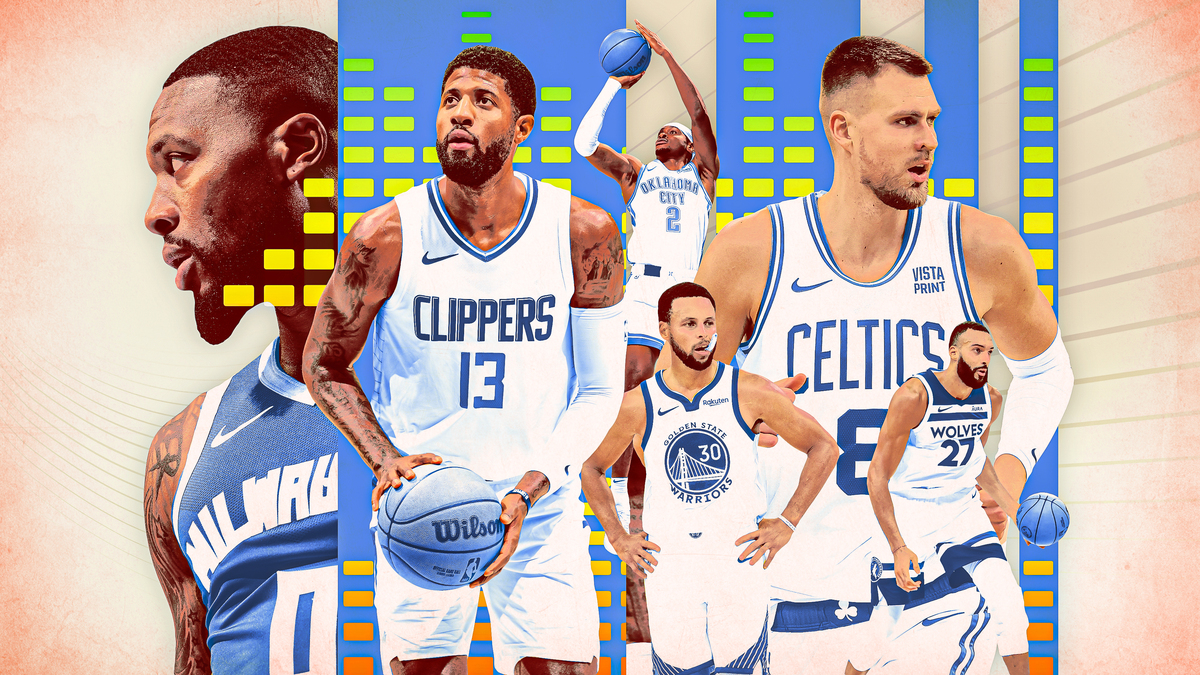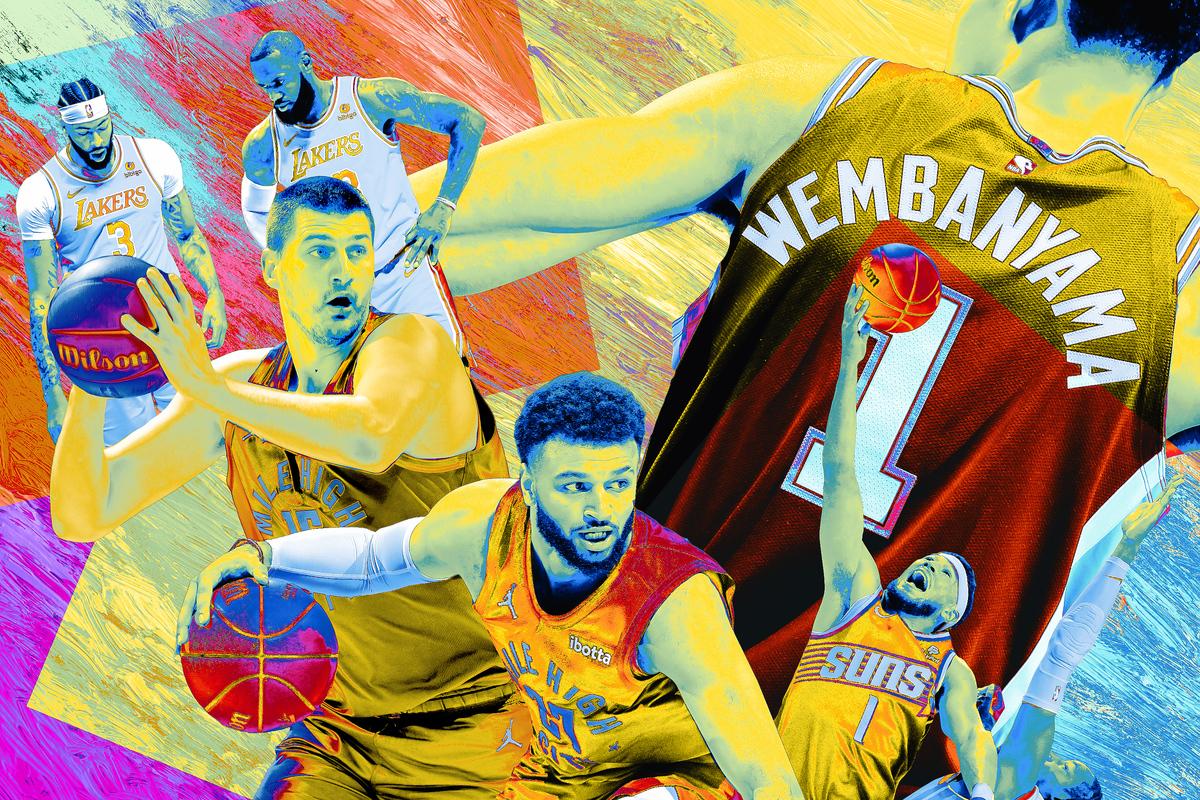
Each Wednesday of the NBA season, we’re analyzing a grab bag of topics from around the league—from the essential stories to the wacky moments, from statistical analysis to obscure minutiae. First up: The Denver Nuggets remind the world they’re the true championship favorites, Victor Wembanyama prepares for his NBA debut, and the Golden State Warriors find the silver linings in their opening-night loss to the Phoenix Suns. This is the Kram Session.
Under Review: There’s No Sign of a “Championship Hangover” in Denver
All the top-tier title contenders were active on the trade market this offseason, with the goal of making significant strides to a championship. The Bucks traded for Damian Lillard. The Celtics traded for Jrue Holiday and Kristaps Porzingis. The Suns traded for Bradley Beal. The Warriors traded for Chris Paul.
Well, almost all the top-tier title contenders fit that description. The reigning champion Nuggets stood apart from the fray. While a pair of important veterans from the title-winning squad departed Denver in free agency, with Bruce Brown signing in Indiana and Jeff Green in Houston, the Nuggets added only youngsters and otherwise stayed the course with the roster that just won it all.
Amid all the transactional drama, that inertia is perhaps the reason the Nuggets have been somewhat overlooked this month—even by TNT, which was televising the NBA season opener in Denver on Tuesday.
But after the Nuggets received their championship rings and raised the franchise’s first championship banner to the Ball Arena rafters, they went right back to business, reminding everyone who might have forgotten that, actually, they’re still the true title favorites. Denver took the lead three minutes into its game against the Lakers and never gave it back, en route to a 119-107 win that bore an incredible resemblance to all the games it won in its Western Conference finals sweep last spring.
Most important for their chances at winning back-to-back championships, the Nuggets’ starting lineup didn’t lose a step over the summer. All five Denver starters scored in double figures, led by Nikola Jokic with a casual 29-point triple-double. In their first stretch of the new season, a six-minute stint off the opening tip, the Nuggets’ starters scored 20 points on 13 possessions—good for an eye-popping 153.8 offensive rating.
It’s important not to overreact to a single game, let alone six minutes. But for the Nuggets five, Tuesday’s offensive excellence was merely the continuation of a trend they’ve already sustained for a full season and playoffs. (If anything, this lineup might be even more electric in 2023-24 than it was last regular season because Jamal Murray is no longer rusty after returning from ACL surgery.)
Even with that group intact, a repeat title won’t be easy. None of the past five NBA champions won again the following season, and the last three teams that did successfully repeat—the 2018 Warriors, 2013 Heat, and 2010 Lakers—all trailed in the second half of an elimination game during their second run to a championship.
But one thing that shouldn’t be an issue for Denver this season is a so-called championship hangover because that’s mostly a myth. Sure, title winners tend to take a small step back in the next regular season—but that’s more about natural regression to the mean for any team that wins a lot of games than any sort of post-championship effect specifically.
To test the championship hangover idea, I looked at all teams this century that won at least 52 games, because that was the lowest win total for a title team, and split them into two groups: teams that won the championship and teams that didn’t. (Shortened seasons were extrapolated to 82 games.) Then, I analyzed how the two sets of teams performed in the next season, following their 52-plus-win campaign.
In the regular season, the results were about the same, if not better for the championship group. The average champion lost 3.9 wins in the following regular season, while the average non-champion in this sample lost 5.9 wins.
Teams With 52-Plus Wins, a Year Later
And in the playoffs, the results were extremely in favor of the championship group. Nearly half of the teams in the championship group returned to the Finals the following season, while nearly half of the teams in the non-championship group didn’t even make it past the first round.
Teams With 52-Plus Wins, in the Following Postseason
Despite a deeper, more competitive Western Conference field this season, it would frankly be stunning if a healthy Nuggets squad didn’t venture deep into the playoffs once again. The fact of the matter is that no opponent in the world can guard their best player one-on-one. Anthony Davis might be the best defender in the NBA when healthy, and even he can’t slow Jokic down. On Tuesday, Jokic drew two and-1 opportunities off Davis fouls in the first half, and occasionally roasted the four-time All-Defensive honoree in the post.
Single-game plus-minus should be taken with a heavy dose of salt, but it’s notable that Jokic finished with a plus-15 margin in the game, while Davis was down at minus-17. The Nuggets emphatically won the minutes the two All-NBA bigs shared.
There was some curiosity over the offseason about why rival contenders that want to take Denver down weren’t adding players who could match Jokic. Note that most of the All-Stars who switched teams—Lillard, Holiday, Beal, and Paul—are guards, not bigs. But if even Davis can’t stop Jokic, then who can? Who could the Suns or Warriors have added to stop Jokic from tallying triple-doubles with ease?
For as wonderful a two-way player as Bruce Brown is, he was still only the Nuggets’ fifth- or sixth-most important player last season. That loss shouldn’t stop a team that was so dominant, with a 16-4 record across its playoff journey.
Brown’s absence does, however, help inform the two overarching goals the Nuggets should have in this regular season. First, they need to stay healthy. And second, they need to find two or three bench players—the number they used regularly in last postseason’s rotation—whom coach Michael Malone can trust to give minutes to next spring.
Christian Braun is the favorite to take one of those spots in his second season as a pro. Newly extended Zeke Nnaji will have a chance to prove his worth as a backup big. Reggie Jackson was the first Nugget off the bench Tuesday; the veteran guard had a strong opener, nailing a pair of 3-pointers and doing a bit of everything on both ends.
That trio is joined by a group of young players who should get every opportunity over these 82 games to prove they belong in Denver’s playoff rotation. At the very least, they’ll display flashes of quickness, length, and athleticism—an intentional selection from general manager Calvin Booth, who told The Ringer’s Kevin O’Connor that he specifically sought players with long wingspans as he built out his roster’s depth. Look at how one Nuggets bench unit rotates on a string on this first-quarter play, which ends in a Peyton Watson block at the rim.
(One Nuggets bench player who didn’t appear at all in Tuesday’s game is first-round draft pick Julian Strawther. Malone should give him a look as the season progresses because he shot 14-for-31, or 45 percent, from distance in the preseason.)
This sort of youth experimentation at the back end of the rotation could bring growing pains and prevent the Nuggets from landing the West’s no. 1 seed again. But if Denver does fall short of its 53-win total from 2022-23 for this reason, don’t call it a championship hangover. In the most important games, the Nuggets will still feature the best player and the most unstoppable five-man unit in the league.
Zacht of the Week: 43 Points and 28 Rebounds
All eyes will be on San Antonio on Wednesday night, as Victor Wembanyama makes his long-awaited debut. Wemby hype is astronomical; look how much more Google search traffic he’s received relative to other recent no. 1 picks.
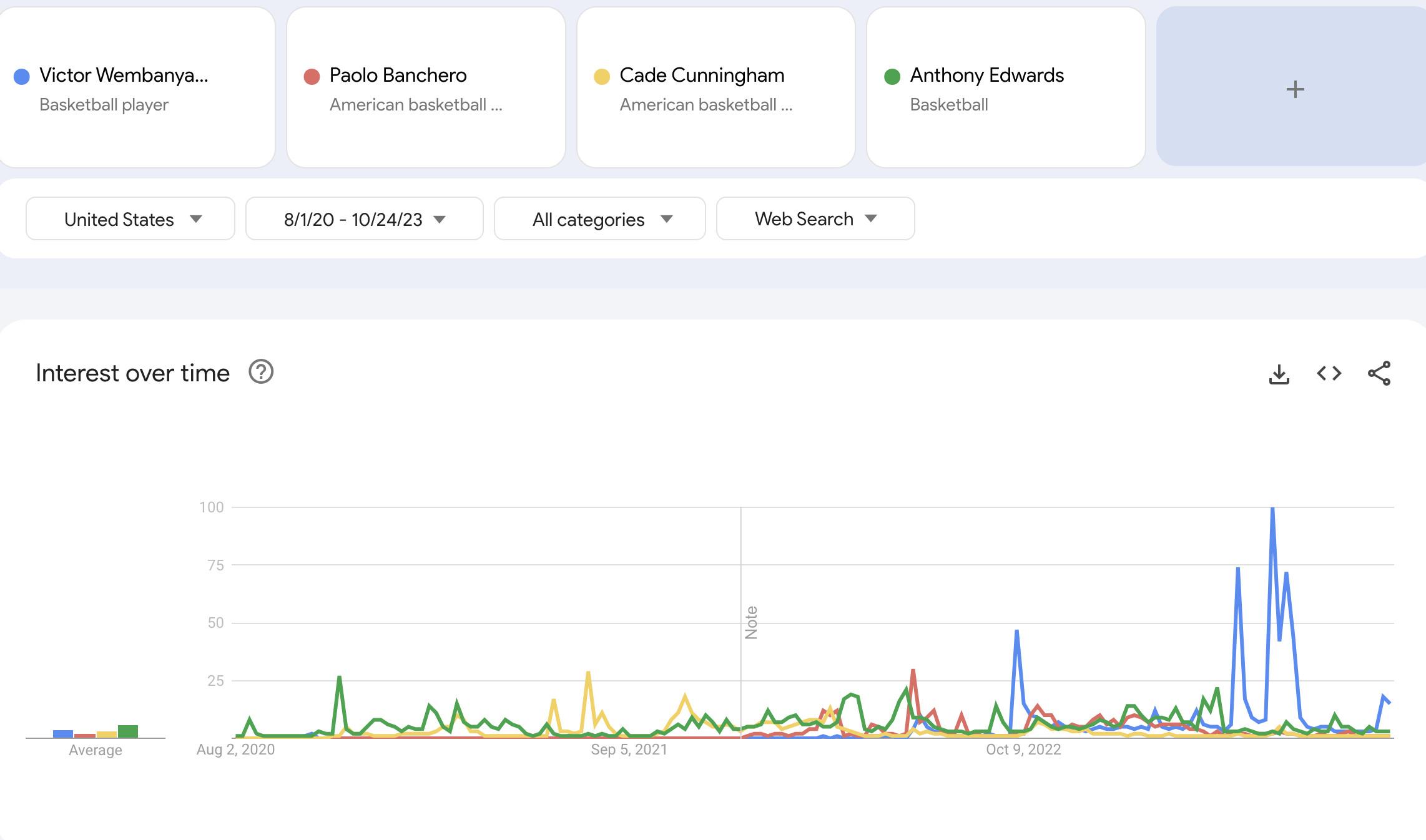
Wembanyama has four separate spikes that go higher than anything Anthony Edwards, Cade Cunningham, or Paolo Banchero has ever seen: at the times of his two-game extravaganza in Las Vegas, the lottery, the draft, and his summer league debut.
But it’s another wildly hyped rookie whom Wembanyama is chasing for the best debut in league history: Wilt Chamberlain, who now has the Rookie of the Year trophy named after him. Chamberlain was already an international celebrity and the NBA’s highest-paid player by the time he debuted. And he immediately justified all that attention, tallying a record 43 points and 28 rebounds in his first NBA game en route to winning MVP as a rookie. Top that, Vic!
Here are the NBA’s first-game records from other statistical categories, in case Wembanyama—or any other rookie—goes wild this week:
- Points: 43, Wilt Chamberlain
- Rebounds: 28, Chamberlain
- Assists: 14, Ernie DiGregorio
- 3-pointers: 7, P.J. Washington
- Blocks*: 8, Shawn Bradley
- Steals*: 9, Michael Carter-Williams
* Basketball Reference has full block and steal numbers dating back to 1982-83.
More recently than Chamberlain, the best NBA debut of the last few decades belongs to Carter-Williams, who started his surprise Rookie of the Year campaign with 22 points, 12 assists, nine steals, and seven rebounds. Carter-Williams even made four 3-pointers in his first game, which ended up being his career high.
Take That for Data: Much Ado About Starting Lineups
One common story line across the NBA at this point on the calendar is the official resolution to preseason position battles. A few rare teams, like the Nuggets with their championship quintet, don’t have to worry about such drama: Their starting fives might as well be etched in stone.
Most teams, however, entered training camp with at least one or two question marks in the starting lineup and multiple players competing to grab those roles. Every preseason game offered hints about which way a coach was leaning.
But I’m here to tell you that the outcomes of those battles don’t really matter over the long haul. Sure, starting on opening night is a nice boon for the player, and learning that, say, Terance Mann will start for the Clippers offers some clue about how Tyronn Lue wants to play this year. More broadly, though, due to injuries, trades, or just typical rotation shuffles, starting lineups change all the time, and there’s nothing necessarily lasting about a team’s opening night group.
In 2022-23, the average team used the starting lineup from its season opener just 13.7 times over the full season. That means teams tabbed other lineups to start five-sixths of the time. Only two—the Hawks, with 42, and the Nuggets, with 41—used their season-opening lineups in more than 33 games.
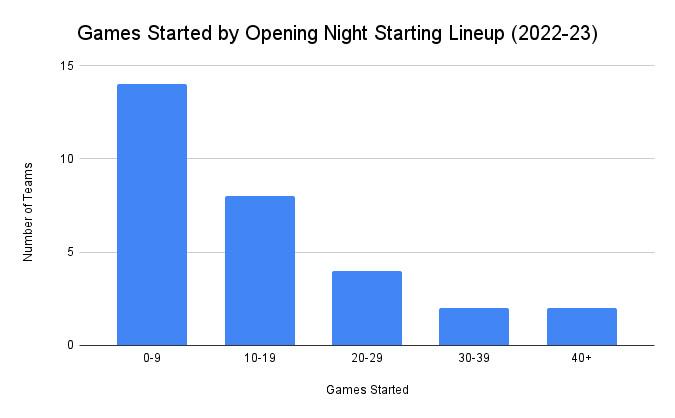
For only 10 teams, moreover, did the starting lineup from opening night double as the most used starting lineup over the full season. Instead, for two-thirds of the league, a different fivesome started more often than the opening night group.
Maybe this pattern will shift this season due to the player participation policy and other initiatives aimed at curbing load management, which should keep stars in starting lineups more often. But don’t count on much of a change; too many other obstacles—mainly injuries—get in the way of lineup continuity. Last season, the longest any team went into the season without changing its starting lineup was a mere nine games.
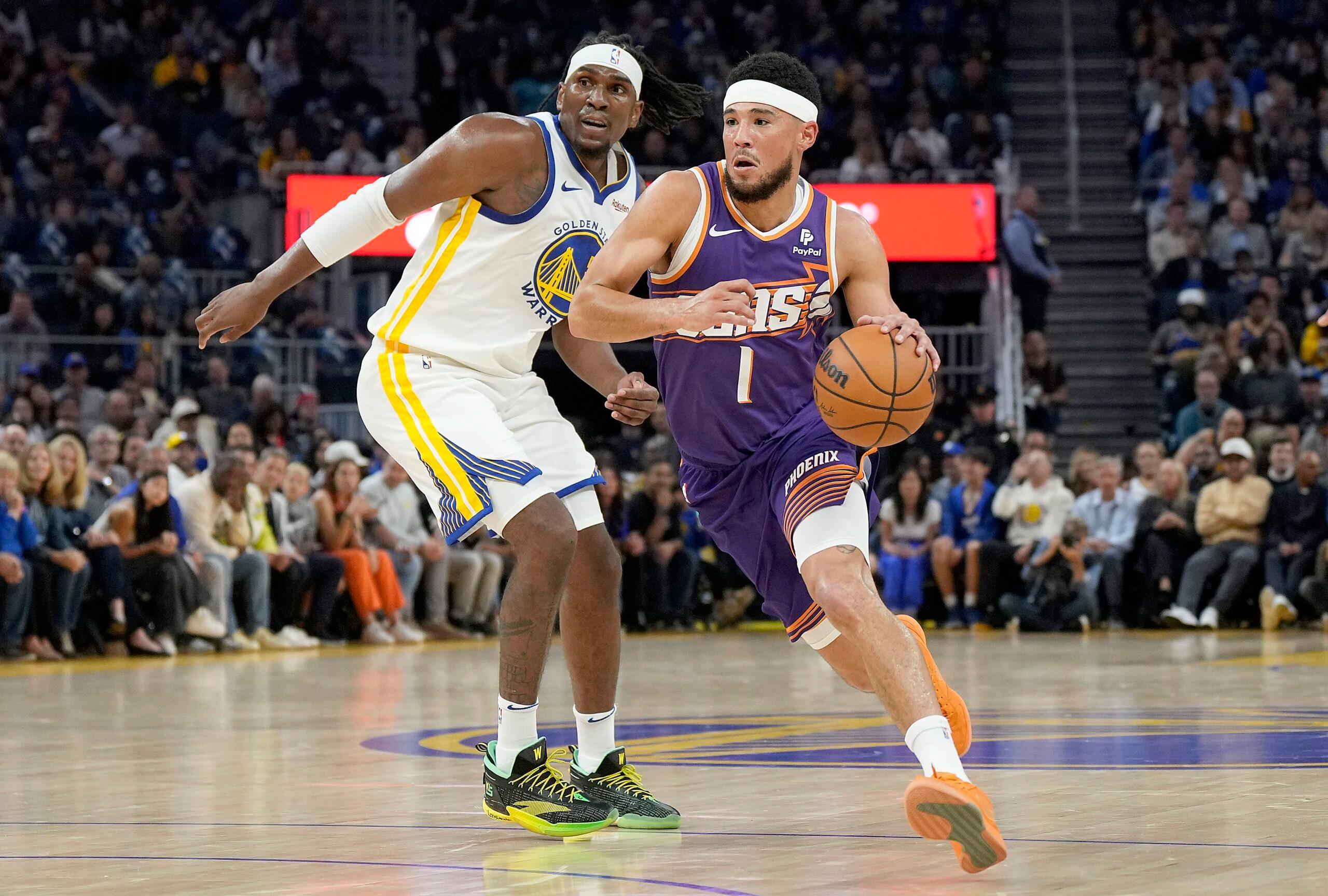
Fast Breaks
1. One big question that emerged following the Milwaukee Bucks’ trade for Damian Lillard: Does Milwaukee now have the best duo in the NBA?
The Ringer can help by offering one way to answer this question, via our Top 100 Player Rankings. If we average the rankings for each team’s top two players, we find, remarkably, a three-way tie at the top.
Best NBA Duos, Based on Top 100 Player Rankings
Naturally, those three teams at the top represent three of the top four title favorites this season, along with Boston, which has a slightly worse top duo but the best three through six in the league.
2. The Phoenix Suns won the late game Tuesday, behind more brilliance from Devin Booker.
Don’t draw too many conclusions from this contest: Beal and Draymond Green were both held out because of injuries, and two normally effective offenses combined for a subpar 28 percent mark from distance. But the Suns withstood a trademark Warriors third-quarter surge and sneaked out of Golden State with a win as Booker recorded 32 points on 13-for-21 shooting.
The Booker-at-point experiment warrants further watching, especially once Beal returns and Phoenix’s offense can take its full shape. Game 1 was a mixed bag in this regard. Booker excelled as a scorer and dished eight assists, including a game clincher when he found new center Jusuf Nurkic rolling to the rim in the closing seconds. Yet Booker was also responsible for six of the Suns’ 19 turnovers, which is an unhealthy ratio he’d surely like to improve going forward.
3. The Golden State Warriors loss came with two bright silver linings.
Jonathan Kuminga—the NBA’s leading scorer this preseason!—and Moses Moody combined for 23 points, nine rebounds, and five steals (!) on 8-for-14 shooting. There were ups and downs, as should be expected of the pair of third-year former lottery picks: Kuminga picked up three quick fouls in the first half and missed two clutch free throws late, while Moody didn’t score after halftime.
But if the Warriors want to return to the promised land, they need one or both of Kuminga and Moody to break out this year. Without the two 21-year-olds, Golden State probably doesn’t have the depth outside its top six players, or the size within that sextet, to push for another title. Yes, Golden State dropped a home game against a division rival, but coach Steve Kerr should be encouraged by the minutes he saw from his young guys.
4. We learned a potentially crucial bit of news about LeBron James’s season on Tuesday.
The 38-year-old James, in his 21st season, played only 29 minutes—the fewest for any of the 10 starters in Denver. Afterward, Lakers coach Darvin Ham told reporters that would “in all likelihood” be representative of his workload for the rest of the season.
LeBron has never averaged fewer than 33.4 minutes per game in a season; last year, he was at 35.5, a top-20 mark among players with at least 50 games, and he played 47 minutes and 56 seconds in the Lakers’ last playoff game. It’s understandable that Ham would want to be more conservative with a player who has LeBron’s workload.
But that move would come with big short-term costs for a Lakers squad that still relies on LeBron as a primary scorer and creator. Again, small sample, yadda yadda, but the Lakers were plus-7 with LeBron on the court against Denver and minus-19 in 19 minutes—they lost a point a minute!—without him.
5. The other Los Angeles Lakers superstar had a rather less impressive season opener.
Anthony Davis scored 17 points in the first half in Denver but put up a goose egg in the second. Worst of all, he attempted only two 3-pointers (making one) out of his 17 shots, falling well short of the six 3s per game that Ham requested of his center this year.
I kid, but Davis’s 3-point rate might have been the most notable individual stat of the preseason, when process is more important than results. In the 2022-23 regular season, only 8 percent of Davis’s shot attempts were 3s—but he boosted that rate to 30 percent this preseason, for the largest increase of any player with at least 40 total attempts. It remains to be seen, however, whether that shift in approach translates to games that matter.
6. On a teamwide level, the Cleveland Cavaliers were the standout in preseason 3-point rate.
This preseason, 48.7 percent of Cleveland’s shots came from beyond the arc, second most behind Boston. Last season, for comparison, the Cavs ranked just 17th in 3-point attempt rate, at just 37.1 percent of their total shots.
Some of that increase is probably due to vagaries of the preseason—like lots of playing time for Emoni Bates and Sam Merrill—and thus won’t translate to games that count. But at the very least, the addition of free agents Max Strus and Georges Niang, who combined for 35 3-point attempts versus just nine 2-point attempts this preseason, appears to be paying immediate dividends in terms of adding a new element to Cleveland’s offensive plan.
7. We’ll end on one more jaw-dropping Wemby note before his debut.
Wembanyama tallied 11 blocks in 83 preseason minutes. If he sustains that rate in the regular season, he’ll need to play only 31 minutes per game to surpass four blocks on average. No NBA player has reached four blocks per game since Dikembe Mutombo in 1995-96; the high this century is Theo Ratliff’s 3.74 in 2000-2001.
It seems impossible, but we might be underselling Wembanyama’s immediate potential. No rookie has made an All-Defensive Team in a quarter century—but the last two to do so were a pair of fellow no. 1 picks for the Spurs, Tim Duncan and David Robinson.


